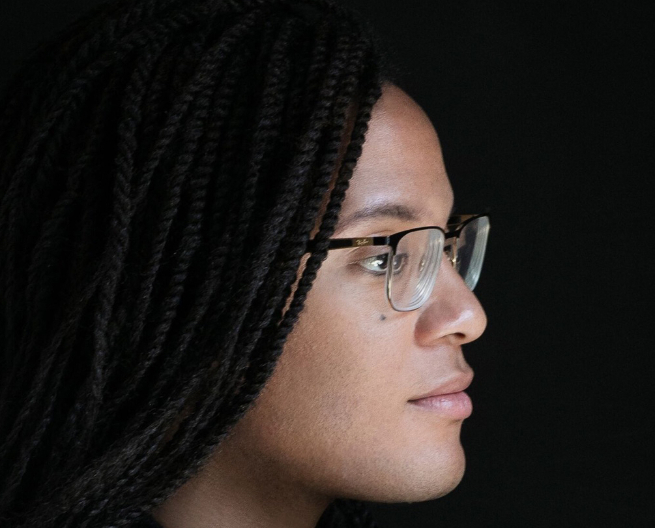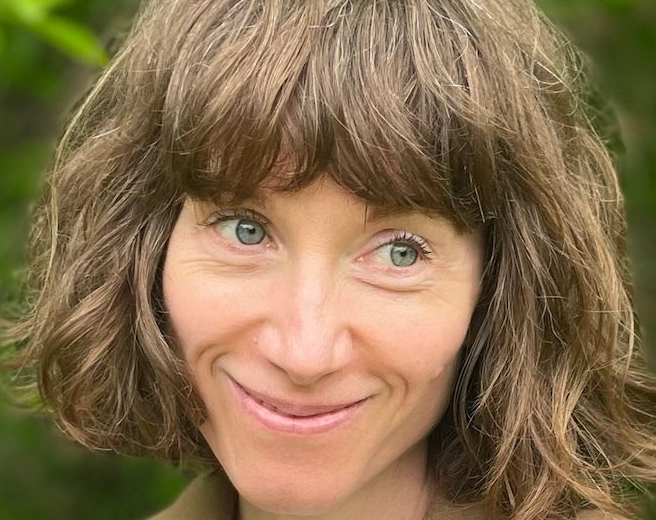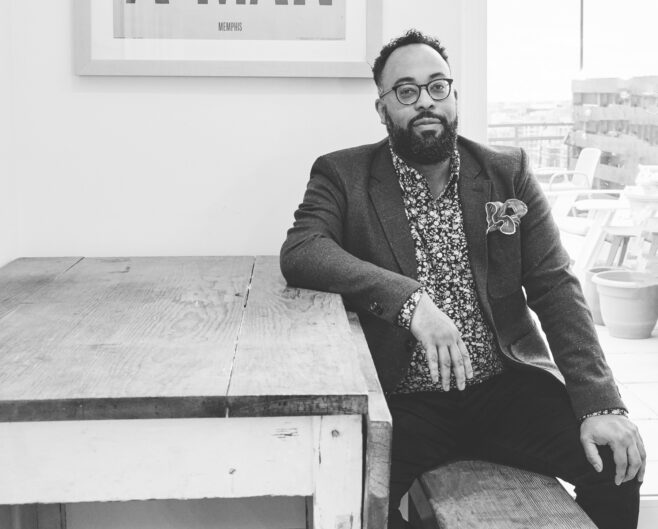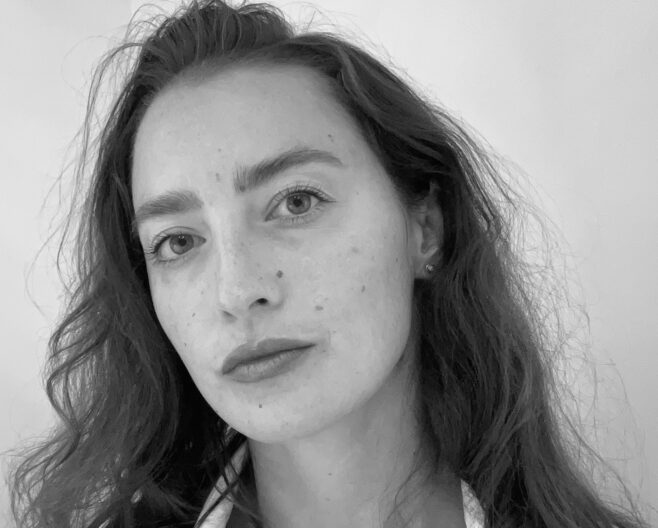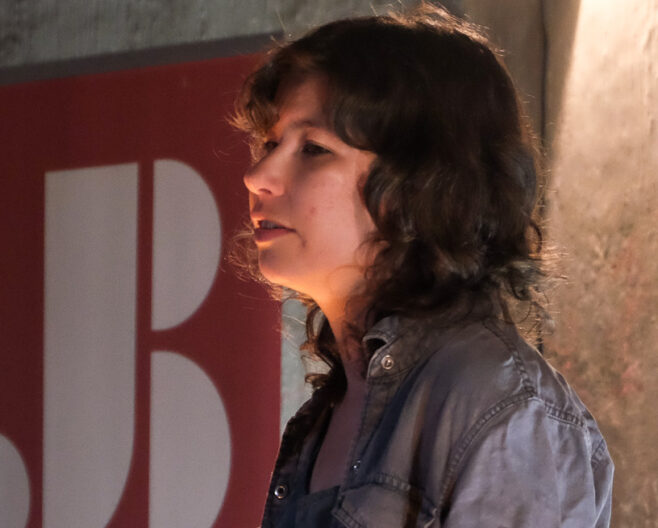“She was dying and I was there. I just started writing.”
EILEEN MYLES
Interviewed By: Kaveh Akbar
In my late teens, I read Kathy Acker’s Don Quixote and was blown away, then I discovered the "No New York" noise compilation and fell in love with Lydia Lunch, and then I read your collection, Not Me, and it was one of the first poetry collections that took the top of my head off. It had that line, “Do you know / What the message of Western / Civilization is? I am alone.” I think maybe it was on the cover. I remember just feeling so profoundly understood in a way I hadn’t often before that, at least not in poetry. Can you talk about writing in that time and place, and how that book came about?
It was just a moment. All the people you mentioned were in that moment. We were different and may not have even known each other, but it was this moment where there was a multitude of messages coming out of this time. It was very uncensored and really excited and it just made you feel like there was more room for more. And, Not Me, I wrote that from the late eighties until around 1990, 1991. It’s like, if you’re a poet, there’s a book every three or four years. It’s a period of time. It was a time of huge transition for me. I was at the end of my own incredible use and abuse of drugs and alcohol, so I was sort of ready to be dying. In my early thirties, I remember thinking, “How great, I’m one of the famous dying people!” And then, that didn’t happen. I stopped drinking and taking drugs.
Certainly, as my eyes were opening, my neighborhood was changing. Suddenly, there were all these homeless people, I think because of Reagan, they were just suddenly in the streets and in the subways. And also, there was an explosion of heroin use in the neighborhood. It’s just like, I could see! The shades fell off my eyes. I was seeing the tops of buildings but I was also seeing the street and who was there. I got a dog and I was walking her around Tompkins Square Park when there were, you know, tents, and people were cooking over trash cans. It was Dickensian and it was amazing and it was my city and it was my home and it was my neighborhood.
What I really felt for the whole time, as a poet who comes out of that whole New York School thing, was articulated in this sort of personal writing, I guess in a way claiming personal experience as a possible site for siphoning poetry out of. What I started to understand was that my road was getting unmade. I had been on this sort of trail through trash and debris and perspectives and my scene was actually impersonal, not personal. I felt like the Invisible Man, not the Ralph Ellison one but the movie, the sci-fi one—you could only spot him in the snow when he was shot, by his blood in the snow. I just felt like I was a path through all this stuff, suddenly realizing it wasn’t about Eileen Myles, it was about where Eileen Myles went and what Eileen Myles saw. It was maybe the most illuminating experience for me as a writer, and as a person.
And also, my femaleness… I suddenly had a real hit of what it meant to be a female, what it meant to be a lesbian, what it meant to be a citizen. I was coming of age! It was my late twenties, early thirties, you know? It’s funny, it continues to be the book of my poetry that is most taught, most referenced. It’s also the only book of my poetry that SEMIOTEXT(E) ever published. So, I’m sort of embedded in a culture by them having published my book instead of a poetry press. I think, for a poet, that’s the ideal situation, to be not in poetry, so that you can be picked apart and differently observed and received.
I’d be interested to hear you talk more about that, publishing with a non-poetry press?
Well, poetry needs support, and needs presses. I mean, I just was a judge for the National Book Award this year. And so I read something like 250 books of poetry. And most of the presses were university presses and mainstream presses. The little punky presses don’t send their books to the National Book Awards. They’re like, “How fucking dare you ask me for $75,” or whatever it is to enter the contest, you know? So I think there’s a much messier process for most poetry books. They have small distribution and then they go to a network of friends. I think that poetry has a way of staying in its own world.
It’s weird because poetry is always read widely and there’s always lots of poetry. It’s the absolute easiest art form to practice. You just go from your journal to your notebook to your open mic. You can come to New York today and tomorrow you can be reading into a microphone. That’s pretty much what I did! There’s that kind of localness and immediacy to poetry. But it’s the same way in the music scene where bands follow bands. There’s the sense that the wider culture follows bands and the idea that the wider culture doesn’t follow poetry, but the thing with poetry is that the wider culture idea doesn’t apply.
Having said that, it’s really cool to be a poet published in something not based in the poetry world. Usually, if you go to a poetry reading, it’s poets and their boyfriends and girlfriends or the people they work with, right? Or, if you write about art, you immediately start to attract an art world audience. People immediately get poetry, it’s not that it’s hard to get. It’s just that it doesn’t get out. I’ve had the good fortune about being published by a press that wasn’t about poetry. And then, I do write about art. I went through a phase of being a performance artist. For a variety of reasons, I had the inspiration and the opportunity to step outside of the poetry world, and it was a good experience.
You were also the first “openly female” presidential candidate in 1992. You campaigned across the country. How did that experience come to be?
Hah, right, well, that was the joke. I think the idea was first who was running “as” a female, not in spite of it. First in the time that women had the vote, but also, not counting Shirley Chisholm, and why wouldn’t I? But certainly in the nineties, it seemed completely impossible to be a serious female presidential candidate. I mean, Geraldine Ferraro, was she running for president?
Vice president, I think.
Yeah, vice president, and she came in low. But, it felt like that was right language for the time, for my presidential campaign.
And you really did campaign across the country, you were on MTV.
I campaigned in twenty-eight states and, I think, six countries!
What was that like, the campaigning process?
It was amazing, because whether or not it was considered a kitschy, performance campaign or a comedy campaign or whatever, it actually was a real campaign. In that period of time, if you were running for president, that was all anybody talked to you about. You couldn’t just say, “I’m not running for president right now.” You were running for president. It was the same experience for my then-girlfriend. Part of the reason I brought my dog so much, visually, into the campaign was that she could take the hit almost better than any of us, because she didn’t have to deal with language.
It was so exhausting, but it was so amazing, because it really was the most politicizing experience, in a really global way, that I’d ever had. As a person who has the capacity to take in political information, I had an opportunity and a way and a platform to then dispense it and let it become an integral part of my work, and that was incredible. People handed me information, and I learned so much. I realized that part of my citizenry was having that capacity and processing that information and making choices, what to look at and what to think about and what to care about, what to talk about.
So the experience changed the way you approached politics in your writing?
Oh, absolutely! It just gave me permission in a deep, deep way. I felt like, this is my train. It has never stopped.
It’s like you vetted yourself, you put in the time.
Right, I love that, I vetted myself. That absolutely is the case. That supposedly is written into the Constitution, that one does and can.
Can you talk about how you being involved with the St. Mark’s Poetry Project—what it was and what it became?
Well, in a way, it was a really strong through line. In so many ways, it’s still the same place. I think the thing that’s really interesting about it, as an institution, is that it’s simultaneously a literary arts space that actually has an aesthetic and also, it’s very porous. I’ve seen St. Mark’s change a lot, embrace a lot of different groups and aesthetics, things that are really diametrically opposed, that hadn’t been thought of ten or twenty years ago.
For me, it really functioned like a lot of things: a community, a graduate program, a dating site, a place to borrow money, a place to exchange drugs and sell drugs, a place to leave books and get books, you know? Really, for the first ten years I lived in New York, if I didn’t meet you at St. Mark’s, I didn’t meet you.
That’s awesome.
Yeah! Until I was the director and left the job, then my relationship changed. But, for those first ten years, it was home! It was where I learned to write. There were workshops there, beginning in 1975, and I studied with Paul Violi and Ted Berrigan and Alice Notley and Jim Brodey. And then, I just went to every single reading that I could go to, which meant that I just heard everybody, you know, from Robert Lowell to Gwendolyn Brooks to Charles Bukowski to Denise Levertov. It was just amazing, the range of people who read in those ten years.
It sounds like a dream.
Right? And then I saw the place burn down, which was an amazing experience (laughing). My only regret is that I didn’t get a t-shirt. There was a CBGB’s fire benefit and they had t-shirts, and somehow or another I didn’t get one. It’s the great regret of my life.
Do you think you could still find one on eBay?
I mean, maybe I could, but it wouldn’t be the same.
Sure. You’ve alluded to a struggle with alcoholism in interviews and in your writing (the main character in Chelsea Girls is a lesbian alcoholic named Eileen Myles). Can you talk about that a little, what it’s like to write and teach as a person living with an addiction?
It used to seem like most writers were alcoholics. It used to seem like most adults were. Certainly where I came from. I am very lucky to not die of it. That Scott Fitzgerald line that people used to love to quote: “There are no second acts in American lives.” That’s an alcoholic talking. If he got sober he’d be in life two. And then something else would happen. Life three, four…
Hah, exactly. I’m in my second act at present, too. I think that’s very true, he just didn’t get to his second act.
Exactly, exactly. It’s such an alcoholic line. It’s like, “Yeah, great line to die by.” (Laughing).
It’s almost like a caricature of the sort of thing an alcoholic writer would say, a cartoon of it.
Yeah! It’s memorable because it’s really a good line, too.
You said you stopped drinking and using around the time Not Me came out?
Actually, not when it came out—I was writing the poems when I got sober. I got sober around ’82, ’83. Not Me came out around ’91. It’s a capsule of that time and that transition.
Oh, okay. What was it like to write through that experience? I know lots of people don’t write at all when they’re drinking and using.
Well, I’ve never been a drunk writer. I’ve been a hungover writer, and I’ve been an amphetamine writer. I felt speed, at certain points of time, was really great for writing. And also, just the crazy sugar stuff. Before my drinking was really bad, when I still had office jobs and stuff, I’d wake up and make coffee and then I’d get to work and have some sugary pastry, and my brain would explode! I would write the best poems and just do these drawings. It was like an infusion of chemistry. It was really great. And then, by the time I was at my finale of drinking, I was writing really bad stuff, and was just hopeless on all fronts, including writing. When I first stopped drinking, I wrote for about seven months, I wrote really bad stuff. I was really worried, and I had to make that negotiation with myself, like, “I am going to be sober, even if I can’t be a poet anymore.” And it was a big deal, because being a poet was my main identity.
Right! I interviewed Franz Wright for this same project and he talked about that exact anxiety, how when people get sober, many can’t write for six months or eighteen months. He went so far as to speculate that was why John Berryman ultimately couldn’t do it.
There’re two different ways of looking at it, right? “He couldn’t get sober, so he couldn’t get through it,” versus “He couldn’t get through it because he was so afraid of not being able to write.” It’s just like saying somebody’s fears killed them, which is alcoholism. Like people who can’t have sex sober—it’s a scary thought! If you’ve never been naked with another human being without being drunk, it’s like you have to begin to have sex again. I think that was, perhaps, the greatest payoff of getting sober. I was like, “Whoa, this is an amazing thing!” (Laughing).
Hah! You harness that power in your work. You’ve advised: “Just when you think you’ve written a New Yorker poem, put some pussy in. Sexual language keeps being attractive because it changes the register so radically. It has so much power—obviously—to open the doors to one room, and close the doors to another. It is a living architecture of consciousness.” You do a lot with those tonal leaps, from conceptual to vernacular, from sermonic to sexual. What sort of effect are you hoping to have on the reader?
I’m not. I’m thinking out loud. I try to share my imagination or my imagination of your imagination of being in the world. It’s not static. I’m bored by the terms we have: hybrid, prose poetry, mixed genre. It acts as if forms are perceptions themselves rather than conventions we’ve come up with, like etiquette, to move us and things around without too much fuss. I don’t think any of them serve us entirely, so mixing them up seems like the only hope. We leap, and then we stay still. Evolution, my scientist friend told me, is very spasmodic. Not even at all.
That “inbetweenness” as a mechanism by which to understand identity appears throughout your works. You say: “I can / connect // any two / things.” The notion of “fluidity” seems very important to you, broadly—fluidity of gender, genre, geography.
Well, the fluidity of language is the main one. We just collect and sort things with our senses all day long and there’s something beautiful and ridiculous about that pastime. I mainly do it in words. Gender-wise, I realize we adopt momentary selves and see the world through that lens. Then someone or something addresses us in another. I am really interested in language that works like a camera, following the flow of these things rather than working one angle.
Right. You’ve published some books whose forms are pretty outside the norm—Snowflake/different streets as the convergence of two collections, Skies (where every poem is about the sky in some way). Do people react to works like these differently?
I guess people want to talk about it all the time (laughing). I think that’s cool. It’s sort of like putting a record together. We still call all the different physical formats for music records, I think. But there was a way in which, as long as it’s vinyl, you really think a lot about what track follows what track. You place the needle, but really mostly you listened to the flow of the whole album. I think that’s training for poetry, just looking at how records were assembled, what kind of musical experience the artist wanted you to have next. It helps you think of the book as a fossil, as a living fossil of a poetry reading. That’s what I think about the most. There’s the order in which you wrote the thing, the actual chronology, and that’s sort of in there, but more important, I think, is the chronology of reception, how you can imagine people will imagine people will hear the book.
There’s that famous Frost quote about how if you write twenty-five poems, the book itself should be the twenty-sixth. You’re sort of talking about that in terms of a poetry reading.
That’s interesting, I like that.
In “For Jordana,” you write, “I think writing / is desire / not a form / of it.” I think about that all the time as I write and as I try to understand the writing of others—can you talk a little about how you understand the line?
Writing is this spilling over. A too-muchness of something—feeling, thought. And, it can’t be corralled, only—sorry but there’s a rhyme coming—wrought. We form, we write straight out of desire, I believe. All different kinds of desire. I want order too.
You mentioned your serving as a judge for the National Book Award in poetry, and that’s something I wanted to talk about. How were you selected, and what is that process like?
I have no idea how I was selected. I have a friend who is an editor and he asked me the same question. I was really surprised. I thought I’d get one before I’d be a judge. Meaning: I didn’t expect either. Well, it was fascinating. I read so much and I read people like Mark Strand who I had never read before. My world of poetry was less there, and that other world was spilling over. There was a lot of great work. But, I felt like experimental writing could easily be labeled grad student stuff. I really was shocked at how unserious or unoriginal it was, in the sense that experimental work looked like other experimental work to some of the judges. It was that thing of something looking the same since you weren’t either experienced or truly interested in looking at it. Things got short and there were only so many battles. I never thought Louise Glück would get it. Her fans were steady but not overflowing. I guess that’s one way to play your cards.
That’s fascinating. It’s a perspective we don’t often get to hear. That sounds similar to the story of how Anne Sexton won her Pulitzer—her book was the only one common on the lists of all the judges, though none of them had listed it as their favorite. Sexton’s was the one that ended up getting it, not because anyone was super gung-ho about it, but because it was the one on everybody’s list.
Exactly. And also, this year was unique in that, of the five finalists, there were two African-Americans. You would think that would lead to an African-American win, you know? But it didn’t. I was obviously disappointed.
I think a lot of people thought this was Claudia Rankine’s year to win it.
Absolutely. And it was weird to me to be on the panel and know that. It was very strange to know that, to be told that she had it (laughing). It was very strange. We talked about that book a lot. Honestly, the more disruptive book was Fred Moten’s. Moten’s book is amazing. But, it isn’t as receivable as Claudia’s. Claudia’s is very much the book of the moment because of the stuff, the material she takes on. And how she takes it on. She does her own shunning of categories. But, Fred took it on more obliquely.
Sure, I can see that. Claudia’s book had enormous universal appeal. I think, as we speak, it’s number nine on the New York Times non-fiction bestseller list, which, for a book of poetry, is nuts.
(Laughing) That’s really funny that they call it “non-fiction” too, but I think it’s great. I think it’s really great to call poetry non-fiction, because it is. But it could also be on the fiction list! Not Claudia’s book, necessarily, but some books of poetry, why not?
Absolutely.
I think it’s really great. Any way that you’re messing with those categories is really triumphant.
You write novels, essays, short stories, etc. How does your approach to writing change when you’re writing prose?
It doesn’t change, it writes prose. They’re like different jobs. Writing into something is really different from writing something right now, which is how I experience poetry. I don’t write sets of poems. I write long poems but maybe those are a little similar to prose. With any long thing you’re moving it ahead, but you’re trying not to shut it down. So there’s a kind of weaving that has to lighten rather than tighten in a rhythmic way, so it doesn’t stop, or so you don’t write yourself into corners. Every piece has its own narrative.
You were recently awarded a Guggenheim to work on Afterglow, a memoir about the afterlife of a beloved dog. I saw you wrote, “I'm particularly enjoying the process of slaughtering the form (memoir) by a swinging a dead dog I loved around my head.” Can you elaborate on the project? What gave you the idea, what have you learned in writing it, and when do we get to read it?
She was dying and I was there. I just started writing. It seemed the way to honor her and after she was dead I kept giving myself assignments and following through. She was a very deep magical dog and I saw a lot of my father in her, so it immediately was about more than the obvious. I’ve always loved sci-fi and fantasy and outside of one chapter in Cool For You (the one about the solar system) and my libretto, Hell, I’ve never unleashed that part of my mind in my writing before. It’s great. It’s like a whole other earth. By the time I’m done I’ll have learned to write this book. I might finish it in March, in which case it could find a publisher by May, so it could come out Fall 2016. I have two books coming out in Fall 2015, so that’s a lot.
What’re the other ones?
One of them is a new and selected and it’s called I Must Be Living Twice; the other is a reissue of Chelsea Girls. They’ll be out with Ecco/HarperCollins. Those two books are already with the publisher. The book that I’m finishing, the one about my pit bull, is mostly done…
That’s a lot of plates to be spinning.
It is, it is. It’s kind of overwhelming, but I think it’ll be okay.
Interview Posted: January 20, 2015
MORE FROM DIVEDAPPER. (Drag left)





